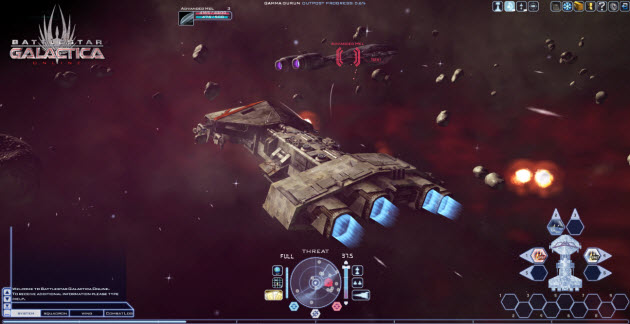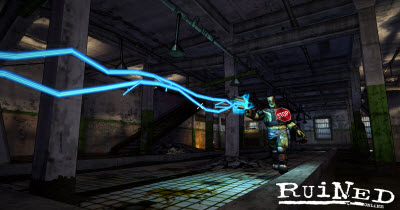 In a big endorsement for browser-based digital game distribution, German online game firm Bigpoint is announcing today that it will distribute online games for gaming powerhouse Electronic Arts.
In a big endorsement for browser-based digital game distribution, German online game firm Bigpoint is announcing today that it will distribute online games for gaming powerhouse Electronic Arts.
 Under the deal, Bigpoint will make EA’s online-only games such as Battlefield Heroes or Tiger Woods Online accessible on Bigpoint’s distribution channel, which has more than 180 million registered users for its browser-based online games. The deal is a kind of coming of age for Bigpoint, a Hamburg, Germany-based company that has pioneered a business in the digital online world that major console game publishers such as EA are finding increasingly attractive.
Under the deal, Bigpoint will make EA’s online-only games such as Battlefield Heroes or Tiger Woods Online accessible on Bigpoint’s distribution channel, which has more than 180 million registered users for its browser-based online games. The deal is a kind of coming of age for Bigpoint, a Hamburg, Germany-based company that has pioneered a business in the digital online world that major console game publishers such as EA are finding increasingly attractive.
The deal also comes on the heels of some big news at Bigpoint, which has become a powerhouse itself in the new digital games market. Two weeks ago, the company launched a free-to-play version of Battlestar Galactica (pictured at top), where users can play the online-only game for free and pay real money for virtual goods as they go. In two weeks, Battlestar Galactica got nearly 500,000 users, said Heiko Hubertz, chief executive of Bigpoint, in an interview.
The Battlestar Galactica launch is part of a big push into the U.S. market. Hubertz has hired more than 90 people in the company’s San Francisco office and relocated from Germany to San Francisco himself last April. “That’s how seriously we are taking this expansion,” he said.
For EA, the move is a way to get its online games in front of millions upon millions of game players who are accustomed to paying for virtual goods in online games. That business model represents a small part of EA’s business, but it’s growing fast. By the end of March 31, EA expects that its digital revenues will hit $750 million. One of the first online games from EA that will use Bigpoint is Lords of Ultima, a free-to-play fantasy massively multiplayer online role-playing game. More games will come later. EA has made a big push into such games in recent years as a way to build up its digital distribution revenue even as it continues to build major console and PC retail games. If such games become a bigger and bigger part of the market, EA can be positioned to take advantage of it through the Bigpoint deal. In the free-to-play world, broad distribution is important. If only a small percentage of players will pay for something in the game, then you have to recruit as many players as you possibly can to make the game a success on a financial level.
But the EA deal is not exclusive in either direction. Hubertz said Bigpoint will announce distribution deals with other major publishers soon. A lot of publishers are drawn to browser-based games now because they don’t require big downloads, which is often a big obstacle for players who have no broadband or weak broadband connections.
 Hubertz (pictured) founded the company in 2002. Among the company’s biggest titles are Seafight and Dark Orbit, which launched in 2006 and 2007, respectively. Those games are available in dozens of languages in 150 countries worldwide. Altogether, the company has scores of games available and 700 employees. Investors include GMT and NBC Universal (Peacock Equity Fund), which paid $110 million for a big stake in Bigpoint in 2008. In an alliance with its part-owner, Bigpoint wants to work on more games with licenses from Hollywood entertainment companies.
Hubertz (pictured) founded the company in 2002. Among the company’s biggest titles are Seafight and Dark Orbit, which launched in 2006 and 2007, respectively. Those games are available in dozens of languages in 150 countries worldwide. Altogether, the company has scores of games available and 700 employees. Investors include GMT and NBC Universal (Peacock Equity Fund), which paid $110 million for a big stake in Bigpoint in 2008. In an alliance with its part-owner, Bigpoint wants to work on more games with licenses from Hollywood entertainment companies.
The next major Bigpoint game coming within days is Ruined (pictured above right), a third-person 3D shooting game. For a browser-based game, the graphics in Ruined are astonishingly good. The web-based game uses the high-end 3D game engine from Unity Technologies. In adopting that engine, Bigpoint is going after people who normally might want to play hardcore console games. Hubertz believes that hardcore online games are an under-served market, while many of the other startups in the game business are now chasing the Facebook and mobile casual game markets.
Hubertz said that Facebook games will continue to grow, but game publishers will have to pay a 30 percent tax for virtual currency transactions to Facebook. By running its own web site, Bigpoint doesn’t have to pay anyone. One of the best things about hardcore gamers is that they spend a lot of money on games. So far, in its first two weeks, Battlestar Galactica has been drawing paying players who are spending an average of $50 on 3,500 virtual items in the game, including spaceships and weapons.
“We think we can get console players to move to the browser and the free-to-play model,” Hubertz said.
Bigpoint’s rivals include Germany’s Gameforge as well as others such as Jagex, InnoGames, Artix Entertainment, Akama, Aeria, and K2 Network. Hubertz said his company has the No. 1 market share worldwide for browser-based games. He said the company has doubled its revenues in the U.S. in the past year.
“We believe local content is very important for a market like the U.S.,” Hubertz said.
VentureBeat's mission is to be a digital town square for technical decision-makers to gain knowledge about transformative enterprise technology and transact. Learn More
